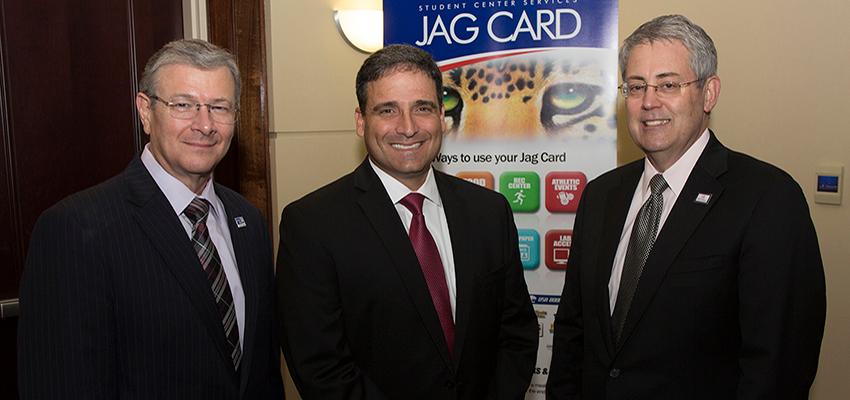The Austal – MCOB Partnership: Shaping Marketplace-Savvy Students through Collaborative Efforts
Out of mutual commitment to forge a more market-aware set of graduates, Austal USA and MCOB embarked on an innovative and ambitious cooperative education and internship journey. Austal was motivated to initiate a substantive partnership with the Mitchell College of Business in supply chain management, offering a plethora of benefits for both parties.
Recognizing the strategic significance of competitive and integrative supply chains to its overall business success, Austal welcomes a reliable source of well-prepared supply chain talent from its neighboring university. At the same time, the Mitchell College of Business is working to develop a stronger, more market-driven supply chain management program that meets the diverse industry needs in this region. The intersection of these two goals by Austal and the Mitchell College of Business led to the co-op and internship programs.
Description of the Partnership
- Co-ops and Internships:
In July 2017, Austal approached the Mitchell College of Business regarding co-ops and internship possibilities. While co-ops are common in other disciplines, especially engineering, they are much less so in business schools. Austal offered three co-ops, starting fall 2017 in the Supply Chain Management (SCM) area, to be continued each semester. Co-op students are paid $18 per hour for 40 hours per week, with the opportunity to participate in the firm’s 401K program.
Co-op students are assigned the responsibility equivalent to a Buyer 1 (an entry-level position in SCM). They are learning the role of SCM in a major organization, just as any beginning professional in the same area.
In addition to co-op, Austal has six internships in SCM. These students work in areas ranging from purchasing, logistics, warehousing, and inventory management.
Very few business school students have the opportunity to work in an environment like Austal and interface with professionals to the degree exhibited in this organization. - Austal Executive Teaching SCM:
The Senior Director of Supply Chain Management has agreed to teach MKT 405 – Current Issues in Supply Chain Management – for the Spring 2018 term. He has a Ph.D. in SCM and many years of SCM experience with Fortune 500 firms. MKT 405 is the capstone course for the new SCM concentration. This will be the inaugural class for this course.
Having an executive teach the SCM class provides a level of practical richness and rigor that affords students a strong opportunity to blend theory and practice. Students will be exposed to real case studies that allow them to more fully understand the intricacies and complexities of the SCM function in organizations.
Supply Chain Management Advisory Board:
The newly-initiated Supply Chain Management concentration will have a dedicated advisory board, consisting of professionals from each sector of the supply chain process. This diversely-talented team will offer guidance and direction on curriculum development, professional preparation, job placement, and general networking with students to better equip them for the challenges and opportunities associated with this career field. Austal SCM executives have offered to play a key role in helping craft the right type of program that will ensure the very best trained SCM student. This industry- and market-driven approach to curriculum development ensures both rigor and relevance.
Future Possibilities:
As the Austal / USA partnership evolves, there are a number of possibilities to be considered. Among some initial thoughts are faculty internships, joint research opportunities, and student scholarships. As the clarion call for more relevant research becomes louder, the prospect of industry-informed applied research in supply chain management and other areas is consistent with the demand for more pertinent scholarly efforts. Concomitantly, short-term faculty internships at Austal and other firms have the potential of better informing both teaching and research. The development of comprehensive case studies, written jointly by practitioners and academics is one example of a product that serves both groups, especially from corporate training, university teaching and research perspectives. The Austal-MCOB partnership can be leveraged in multiple ways to benefit both the academic and business sectors. As we work to engage in developing and implementing mutually-beneficial programs and activities, MCOB students and faculty benefit immensely
Strategic Fit with USA
Goal 5 of the University of South Alabama Strategic Plan is University-Community Engagement. More specifically, objective 5.1 states ‘increase experiential learning experiences for USA students in the private and public sectors." The Austal / MCOB partnership embodies the complete spirit of objective 5.1. Anecdotal assessment from the three co-op and six internship students universally indicate the value of the program. Students have said that the value and substance of the program far-exceeded any of their expectations. The most frequent comment is ‘I cannot believe they have given us so much responsibility in such a short period of time.’ Students have been immersed very quickly and are expected to master the key concepts at a rapid rate.
Fit with Accrediting Agency
The Mitchell College of Business is accredited by AACSB International – The Association to Advance Collegiate Schools of Business. AACSB is the premier accrediting body for business schools in the world. Three major tenets of AACSB include: engagement, impact and innovation. The Austal partnership is a perfect fit with these three tenets and the overall mission of AACSB. As business schools seek more practical, relevant partnerships like Austal will become increasingly essential to business school growth and survival. Thus, the Austal linkage is the template from which additional joint efforts spring that will benefit students and faculty.
On balance, the Austal / MCOB alliance offers a stellar opportunity to: (1) strengthen community and MCOB engagement; (2) encourage joint industry, faculty and student research; (3) build student skill-sets that prepare MCOB graduates for increasing responsibility in entry-level jobs; and (4) build the foundation for additional efforts with development potential.







